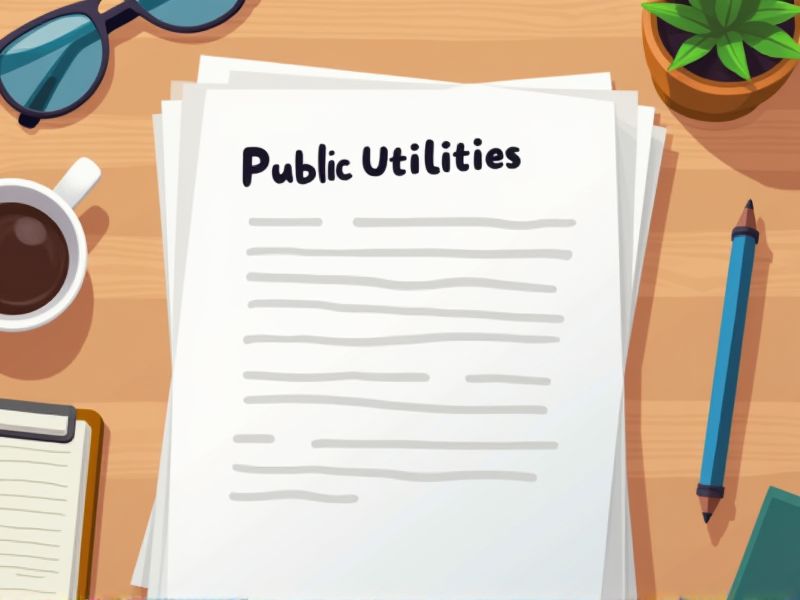
Managing public utilities effectively requires specialized knowledge due to the complexity and scope of the services involved. Certifications validate a manager's expertise in critical areas such as environmental regulations, resource management, and infrastructure planning. These credentials ensure that the manager can uphold industry standards and enhance service delivery while addressing community needs. Here are some important certifications you may need as a Public Utilities Manager.
Certified Public Manager (CPM)
Certified Public Manager (CPM) training often equips Public Utilities Managers with enhanced leadership skills, which can lead to more effective team management. Because CPM programs emphasize problem-solving and decision-making techniques, managers can better navigate complex regulatory environments and resolve issues efficiently. The structured learning process in CPM fosters a deeper understanding of fiscal policies, enabling managers to optimize budget management and resource allocation. The CPM credential often lends credibility, aiding in stakeholder trust and facilitating smoother communication within public administration contexts.
Project Management Professional (PMP)
The Project Management Professional (PMP) certification provides public utilities managers with a standardized framework that improves project execution and resource allocation. A PMP credential enhances a manager's ability to mitigate risks and maintain regulatory compliance within the public utilities sector. Mastery of project management best practices leads to increased efficiency and cost-effectiveness in managing large-scale infrastructure projects. Successfully aligning strategic objectives with project outcomes directly contributes to community satisfaction and trust in public utility services.
Certified Energy Manager (CEM)
Public Utilities Managers require a Certified Energy Manager (CEM) to enhance energy efficiency, leading to reduced operational costs and environmental impact. The CEM credential ensures the manager possesses up-to-date knowledge of energy regulations and technologies, facilitating compliance and innovation. With a CEM, managers can effectively design energy conservation programs, promoting sustainable resource management. The expertise of a CEM helps public utilities in optimizing energy consumption, directly impacting customer satisfaction and trust.
Professional Engineer (PE) License
Holding a Professional Engineer (PE) license ensures that a Public Utilities Manager possesses the necessary technical expertise and knowledge to oversee complex engineering projects. This credential indicates a commitment to ethical practices and creates trust among the community and stakeholders served by the utilities. Legal regulations often mandate that key roles in public utilities are filled by licensed professionals to ensure compliance with safety and environmental standards. The PE license demonstrates an understanding of local, state, and federal regulations, crucial for making informed decisions that impact public health and safety.
Certified Water Professional (CWP)
Having a Certified Water Professional (CWP) ensures the Public Utilities Manager possesses specialized knowledge in water quality standards and regulations. This certification also demonstrates the individual's proficiency in managing complex water systems and infrastructure. By employing a CWP, public utilities can effectively address community water safety and compliance issues, reducing the risk of health hazards. Possession of CWP credentials promotes trust and accountability with the public, enhancing the reputation and operational success of utility services.
Lean Six Sigma Black Belt (LSSBB)
Implementing Lean Six Sigma Black Belt methodologies empowers a Public Utilities Manager to streamline operations, leading to enhanced efficiency in resource management. The capability to analyze and reduce waste directly impacts cost savings, allowing public utilities to allocate budgets more effectively. Data-driven decision-making resulting from LSSBB training ensures that utility services are both reliable and of high quality, addressing customer satisfaction. Equipped with problem-solving tools, a Public Utilities Manager can preemptively tackle infrastructure challenges, minimizing downtime and service disruptions.
Certified Safety Professional (CSP)
Holding a CSP credential for a Public Utilities Manager enhances their ability to identify and mitigate workplace hazards, reducing the risk of accidents and injuries. The certification ensures the manager is equipped with the latest knowledge and skills in safety protocols, which is critical for maintaining compliance with health and safety regulations. A CSP designation also strengthens credibility and trustworthiness with stakeholders, fostering a culture of safety across the organization. By managing risks effectively, a Public Utilities Manager with CSP can contribute to the operational efficiency and cost-effectiveness of the utilities sector.
Certified Government Financial Manager (CGFM)
Certified Government Financial Manager (CGFM) is crucial for a Public Utilities Manager because it ensures proficient handling of governmental financial regulations and complexities. The CGFM certification provides the manager with an informed understanding of budgeting, accounting, and auditing specific to government requirements. This expertise aids in maintaining transparency and accountability, which are vital for public trust and financial health. Effective management of public resources can lead to optimized utility services for the community.
Utility Management Professional (UMP)
A Utility Management Professional is essential for a Public Utilities Manager as they enhance operational efficiency by integrating advanced data analytics and resource optimization techniques. This expertise leads to improved cost management and helps in reducing waste and resource depletion in water, electricity, or gas services. UMPs are equipped to navigate regulatory compliance challenges, minimizing legal risks and ensuring community safety. Their skills in strategic planning and customer relations result in elevated service delivery and increased customer satisfaction.
Certified Municipal Manager (CMM)
Certified Municipal Manager (CMM) provides public utilities managers with the necessary skills for efficient resource allocation and service delivery. Since public utilities often face complex regulatory environments, CMM ensures that managers are well-versed in compliance and risk management. With the certification, managers gain knowledge in sustainable practices, crucial for reducing operational costs and environmental impact. CMM also enhances managerial decision-making, leading to improved public satisfaction and accountability.
Summary
When you acquire certifications as a Public Utilities Manager, expect an enhancement in your professional skill set, making you more adept at managing complex utilities operations. These credentials can lead to increased trust from stakeholders and colleagues, boosting your credibility within the industry. Certified managers often report not only improved efficiency in project execution but also enhanced strategic decision-making capabilities. The combination of updated knowledge and industry standards likely places you in a strong position for career advancement and potential leadership roles.
